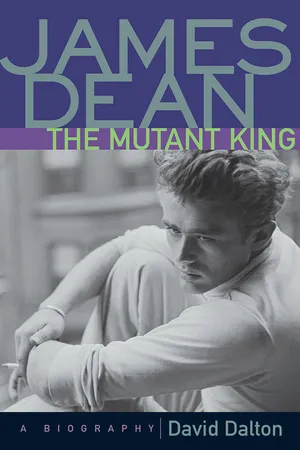
- 384 pages
- English
- ePUB (mobile friendly)
- Available on iOS & Android
eBook - ePub
About this book
This is the book that restarted the James Dean cult by celebrating him as the cool, defiant visionary of pop culture who made adolescence seem heroic instead of awkward and who defined the style of rock 'n' roll's politics of delinquency. The only book to fully show how deliberately and carefully Dean crafted his own image and performances, and the product of still unequalled research, vivid writing, intimate photographs, and profound meditation, James Dean: The Mutant King has become almost as legendary as its subject.
Frequently asked questions
Yes, you can cancel anytime from the Subscription tab in your account settings on the Perlego website. Your subscription will stay active until the end of your current billing period. Learn how to cancel your subscription.
No, books cannot be downloaded as external files, such as PDFs, for use outside of Perlego. However, you can download books within the Perlego app for offline reading on mobile or tablet. Learn more here.
Perlego offers two plans: Essential and Complete
- Essential is ideal for learners and professionals who enjoy exploring a wide range of subjects. Access the Essential Library with 800,000+ trusted titles and best-sellers across business, personal growth, and the humanities. Includes unlimited reading time and Standard Read Aloud voice.
- Complete: Perfect for advanced learners and researchers needing full, unrestricted access. Unlock 1.4M+ books across hundreds of subjects, including academic and specialized titles. The Complete Plan also includes advanced features like Premium Read Aloud and Research Assistant.
We are an online textbook subscription service, where you can get access to an entire online library for less than the price of a single book per month. With over 1 million books across 1000+ topics, we’ve got you covered! Learn more here.
Look out for the read-aloud symbol on your next book to see if you can listen to it. The read-aloud tool reads text aloud for you, highlighting the text as it is being read. You can pause it, speed it up and slow it down. Learn more here.
Yes! You can use the Perlego app on both iOS or Android devices to read anytime, anywhere — even offline. Perfect for commutes or when you’re on the go.
Please note we cannot support devices running on iOS 13 and Android 7 or earlier. Learn more about using the app.
Please note we cannot support devices running on iOS 13 and Android 7 or earlier. Learn more about using the app.
Yes, you can access James Dean: The Mutant King by David Dalton in PDF and/or ePUB format, as well as other popular books in Media & Performing Arts & Film History & Criticism. We have over one million books available in our catalogue for you to explore.
Information
CHAPTER ONE
The Double World
1931-1940
Jimmy is born in a small Midwestern town;
the Deans move to California;
Jim’s mother and her death;
he is sent back alone to Indiana.
the Deans move to California;
Jim’s mother and her death;
he is sent back alone to Indiana.
James Byron Dean was born on February 8, 1931 in a small town in Indiana. He was delivered at home and given the first name of the attending physician, James Emmick, and his middle name, it is said, for the poet Lord Byron.
Jimmy was born under the influence of the planet Uranus, a symbol of light. Light is the nature of fire, mist, phosphorescent insects, lightning, crystals and the moon. It is also the medium of a star and the element into which James Dean transformed himself. On the screen, his presence shines with inexhaustible illumination through his eyes, his mouth, radiating in luminous traces like the firefly’s glowing arc. “The poetry in a man’s life,” said Emerson, “is the light which shines on a man’s hat and in a child’s spoon …” As an actor, James Dean revealed the subtle light which rests so eloquently on everyone, and as we follow his sleight of hand, we wonder how it ever managed to be so elusive. Like everything intimate, remote and transforming, when all was nearly apparent, he disappeared, leaving only his iridescent traces. This was James Dean’s magical capacity.
Marion, Indiana, where Jimmy was born, is an industrial town about fifty miles north of Indianapolis, and he lived there for four years until his parents moved to Santa Monica, California. Winton and Mildred Dean were both native Indianans-Mildred (nee Wilson) from a Methodist family that Jimmy said was part Indian, and Winton a Quaker from a line of original settlers that could be traced back to the Mayflower.
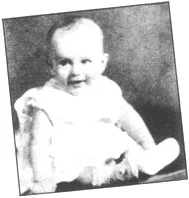
Jimmy at four months old.
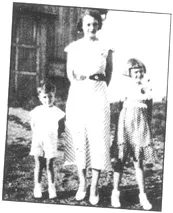
Age two and a half, with Aunt Orlense and Joan.
The doctor’s fee for delivering Jimmy was fifteen dollars, a little less than half the thirty-nine dollars originally paid to the Miami Indians for the entire city of Marion. Considering its present tawdry appearance, it seems appropriate that Marion should have been bought at a discount and that its major contribution to civilization is the invention of the paper plate. It is the typical disposable city.
Here in Marion, Jimmy lived for the first few years of his life in the Green Gables Apartments, a rambling building put up in the late twenties that might now pass as an antique in the rapidly dissolving fabric of the city. When Jimmy was almost three, his father quit his job as a dental technician at the Marion Veterans’ Hospital, and the Deans moved to Fairmount, a small farming community about ten miles to the south, where they lived on Ortense (Winton’s sister) and Marcus Winslow’s farm in a small cottage along Back Creek, a meandering country stream that flowed through the property. Here Jimmy’s father rather whimsically took to raising bullfrogs. Whether he was trying to “grow ‘em with six legs,” as told in an Indiana tall tale, is not known. It’s hard to imagine much of a market for frogs’ legs at the height of the Depression. In any case, the project was a disaster and Winton, Mildred and Jimmy returned to Marion.
Winton, then in his twenties, was a thin, dark-haired man with a somber air. He had never really been interested in carrying on the family’s farming tradition and was more comfortable when he returned to the familiar routine of the hospital. However, a year later, in 1935, he was transferred to the Sawtelle Veterans’ Hospital in Santa Monica, California. Mildred was reluctant to leave her family to start a new life, but conditions were hardly ideal in either Marion or Fairmount. They migrated west with the same kind of earnestness found at the beginning of a James M. Cain novel: “… Things were really tough … I moved to California … I walked down that shabby palm-lined street, 18 cents jingling in my worn gabardine suit …”
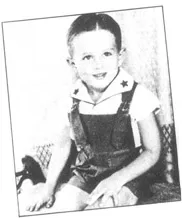
A three-year-old’s smile.
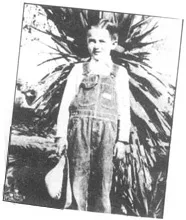
A Yucca on tiptoes. Age five in Los Angeles.
The Deans moved into a typical Southern California “creamcolored stucco igloo,” the kind Jim Backus described with confectious humor in his book Rocks on the Roof:“It was twenty by thirty, but the walls were four feet thick. Sort of a miniature fortress from Beau Geste. Instead of windows, it had slits, obviously designed for the pouring of boiling oil on peddlers.”
Mildred kept in touch with the folks back home, sending frequent photos of little Jimmy to Winton’s parents in Fairmount. In a snapshot of him at five outside the Deans’ home in Santa Monica, with his hair sleeked down and squinting at the sun in overalls and straw hat, he might as well be standing on the farm except for the Yucca which looks as if it had tiptoed up behind him and, like some thorny monster, waits fiendishly for him to turn around. For her birthday, he sent his grandmother a picture of himself and a chubby little girl with his note on the back that said, “My sweetheart.” The little girl beams, but even then Jimmy’s look seemed mildly ironic, almost cool, as if he is on the other side of the camera as well.
Jimmy was a sweet-looking child with features, his grandma used to say, “of a china doll, and the complexion of a ripe apple. Almost too dainty for a boy.” He was sturdy looking in build, but delicate by constitution, often suffering from nosebleeds and internal bleeding which caused black and blue marks on his arms and legs. He was sensitive and probably influenced by his mother’s interest in poetry and art. One writer ascribed the source of Jimmy’s restlessness to the fact that his mother read the Eumenides to him. But it’s hard to believe that the furies he heard within himself were really those avenging ladies of antiquity in their frozen draperies.
It’s not known whether Mildred Dean had ever heard of Byron. “I don’t think she knew who Lord Byron was a ‘tall,” said Bing Traster, a long-time native of the town. “She recited poetry at church gatherings and such, but she never heard tell of Lord Byron. Jimmy Dean’s dad had a chum who was named George Byron Fiest and that’s how he came by that name.” (Byron is a common enough name in farm country, getting appropriately pronounced B’arn farther south.) But in California his schoolmates thought it “queer” and, when they found out how sensitive he was about his middle name, teased him about it.
Mildred Dean created a little theater for Jimmy and herself, and on stages made of cardboard they invented plays, using dolls as actors. Through these childhood afternoons in Santa Monica they materialized many a daydream, fugue-like figures working through tenses from present to past to future, replacing the world around them with one of their own devising.
One of the most compelling stories about Jimmy’s childhood is of the wishing game, a variant on that generous person the tooth fairy and a fantasy that was supposed to be his favorite. Before he went to sleep, Jimmy would put underneath his pillow a piece of paper with a wish written on it. Mildred would slip in while he was asleep, read the wish and, if possible, she would make it come true the next day.
Jimmy was almost nine and his mother not yet thirty when Mildred began to complain of severe pains in her chest. X-rays revealed that she had breast cancer and that it was already considerably advanced. In May of 1940, Winton wrote to his mother in Fairmount that Mildred was dying and asked her to come to California immediately. “I’ll never forget the day the letter came telling us that Mildred, who was so young and lovely, wouldn’t get well,” said Emma Dean in a Photoplay story, “The Boy I Loved.” “I took the letter to our doctor and he judged I’d be in California about six to eight weeks. I was gone seven to the day, and when I brought Mildred’s body back, Jimmy was with me. I’d said to Winton, I recall, ‘Now, I want you to think this thing over carefully. If you see fit to let Jimmy come back to Fairmount, Ortense and Marcus would like to take him in. They’ll raise him for you if you want.’”
“She was only twenty-nine,” Winton Dean later told Modern Screen.“The doctors told me it was hopeless. How do you tell an eight-year-old boy his mother’s going to die? I tried, but I just couldn’t make it. Jim and I-we’d never had that closeness. And my Jim is a tough boy to understand.”
Shortly before Mildred died, Winton told Jimmy that his mother was not going to come home again. “Jimmy said nothing-just looked at me,” Winton recalled. “Even as a child he wasn’t much to talk about his hurts.”
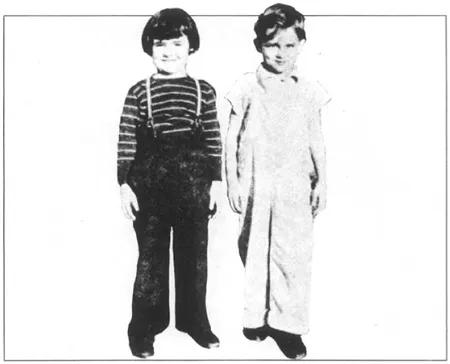
“My sweetheart.”
After Mildred’s death Winton considered returning to Fairmount, but moving would have worsened the already aggravated financial condition which his wife’s illness had created. “I was deep in debt with doctors’ bills, X-rays, radium treatments and everything else. I was alone without anyone to look after the boy when I was at work. I had to get my feet under me again.” Winton had sold his car to pay for his wife’s last operation and couldn’t even afford to go to the funeral in Fairmount.
Sending Jimmy to live with his sister, Ortense, and her husband, Marcus, seemed like the best thing Winton could do. Winton’s mother, Emma Dean, encouraged it: “Ortense and Marcus are a daughter and son-in-law any woman would be proud to own. They do their share in the community … both are wise and gentle and have a great gift for loving. Theirs is like a Quaker home should be. You never hear a harsh word. Best of all, they are happy as well as good-and that’s what Jimmy needed most after the shock of losing his mother.”
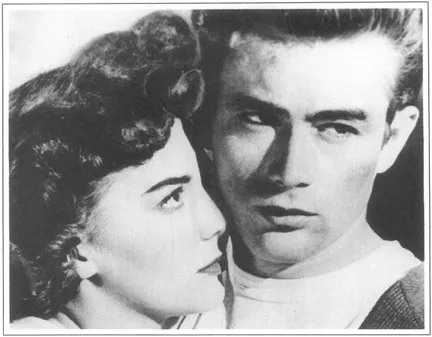
Jimmy incorporated the soft, liquid lines of his mother (with Natalie Wood in Rebel Without a Cause).
Little is known about the mother Jimmy lost when he was just nine years old. Since there has never been a published photograph, writers cannot even agree about her physical appearance and accounts of what she looked like differ: she has been variously described as “dark and plump” or “slim and fair.” But she was engraved in Jimmy-his androgynous features in their soft, liquid lines, incorporated her. You can see it most clearly when he is a child of eight or nine (as if sensitive to the coming separation, he was imprinting a memory of her on himself), and later as the languid young Jett Rink in Giant. Behind Jimmy’s tough-kid facade always shone the face of his mother-a pure, unattainable figure. She “moves in my blood and whispers to me,” Robert Louis Stevenson had written about this presence of his parent within him, “and sits efficient in the very knot and center of my being.”
One can also see his mother’s influence by noting the reverberations in his behavior, the concentric memories of her sunk within him. There are the telltale mother substitutes to whom he attached himself throughout his life: first Ortense Winslow, his aunt, whom he always called “Mom”; then Adeline Nall, his high school teacher, who introduced him to theater and nurtured his separateness; in college in Santa Monica there was Jean Owen, another drama coach; and in New York he found a mother figure in Jane Deacy, his agent. On the movie sets he found Julie Harris, Mercedes McCambridge and Elizabeth Taylor to play the role for him. Jimmy saw his mother in them, and they recognized the child in him.
Barbara Glenn, an actress Jimmy dated years later in New York, said, “Sure, we would sit around and talk about his mother and father and Ortense and Marcus, but the only person I could believe was really close to him as a person was his mother, who died. He never really had anybody, because at that point I think Jimmy lost everybody. It was such an irrevocable loss that it could never be filled.
“He said she had long black hair, that she was thin and very beautiful. He said that she was soft and very gentle and he felt very loved by her. In a strange way she was this fantasy creature even to him. He loved her very much and I don’t know that he had not fantasized a lot about her.
“We talked about his mother a great deal when we first met. I don’t know that it wasn’t a resemblance to her that attracted Jimmy to me. He told me I looked like her-slim, long dark hair … At that time my hair was down to my waist.
“Jimmy had a terrible anger for his mother. She died. He was a nine-year-old child saying how can you leave me? When he talked about her, it wasn’t a twenty-one- or twenty-two-year-old. It was a child and he was deserted. He’d loved her desperately. He’d loved her desperately and she left him. I think it had a profound effect on him. And he expressed it in terms of his art.”
Jimmy was both Oedipus and Hamlet-the somnambulist stumbling into tragedy and the dreamer fighting his way out. Comfortably as these labels nestle into the folds of analysis (“All neurotics,” said Dr. Freud, “are either Oedipus or Hamlet”), the terms will only lead to redundancy. It might be more revealing to say that Jimmy trusted profoundly in the efficacy of magical action, and whether it was a delusion or not, it became the source of his power. These beliefs began in his childhood and were the legacy of his mother.
Jimmy recalled the parts he played for his mother in an interview with Hedda Hopper. It is a catalogue he did not care to elaborate on. “When I was four or five my mother had me playing the violin-I was a blasted child prodigy. My family came to California and before it was over my mother had me tap-dancing. Not at the same time I was playing the violin. My mother died when I was eight and the violin was buried too.”
Poor Mildred. Staked out by speculators and...
Table of contents
- Cover Page
- Title Page
- Copyright Page
- Contents
- Introduction to the Revised Edition
- Chapter One: The Double World (1931–1940)
- Chapter Two: The Omphalos of Normalcy (1940–1949)
- Chapter Three: School Daze (1940–1949)
- Chapter Four: The ’49-er (1949–1951)
- Chapter Five: Persistence of the White Bear (1951)
- Chapter Six: An Orthicon Ghost (1952–1954)
- Chapter Seven: Diary of a Face (1952–1954)
- Chapter Eight: I’m Just a Human Bean (May–August 1954)
- Chapter Nine: Hollywood Babbles On (1954–1955)
- Chapter Ten: No Different Flesh (Fall 1954–Spring 1955)
- Chapter Eleven: Rebel Without a Cause (March–May 1955)
- Chapter Twelve: Wall of Air (May–September 30, 1955)
- Chapter Thirteen: Lone Star State (May—September 1955)
- Chapter Fourteen: Osiris Rising (1955–1974)
- The Mutant King
- Bibliography
- Discography
- Index